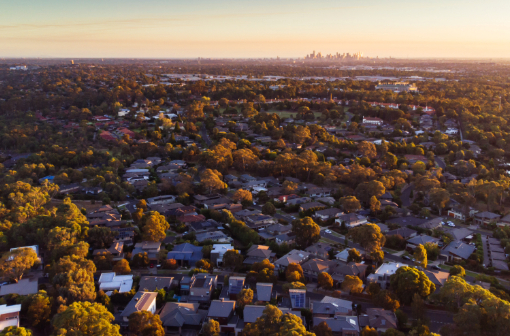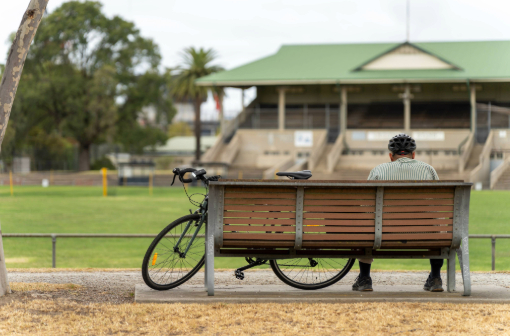“It isn’t just those on low incomes struggling with the basics, it’s a large portion of everyday Australians.”—Dr Kate Lycett, Australian Unity Wellbeing Index lead researcher, Deakin University
Key points
- While wellbeing has previously been low among lower income earners, this year’s Australian Unity Wellbeing Index data showed that Australian households earning up to $104,000 a year are now reporting low levels of personal wellbeing.
- More people are also struggling from material deprivation, meaning that they are putting off paying for essentials like housing payments, food and health care.
- On a brighter note, strong relationships and support networks can help offset financial pressures and contribute to greater wellbeing.
Jenny* admits that her family lives a relatively modest life on Victoria’s Mornington Peninsula. Her husband, Chris*, is a paramedic, and Jenny works as a bookkeeper, using her professional nous to try and keep their household expenditure within a pre-planned budget. Their two daughters go to the local public school and, each year, the family take domestic holidays rather than go overseas. “I would say we have a very basic lifestyle,” she says.
Luckily, their mortgage isn’t too crippling as they bought their three-bedroom home a decade ago, before real-estate prices in their beachside town shot up. Yet Jenny still admits to mounting concerns about the cost of living, and she is constantly trying to economise to free up extra cash. An example? While she loves going to Pilates, she now hesitates over buying a new package of classes.
“When the price of everything else is going up, and you’re getting squeezed on your utilities, for example, you start to question the little things that contribute so much to your wellbeing,” says Jenny. “I’m always thinking about where we could save some money to towards something else.”

Cost-of-living pressures affecting more of us
It’s well established that our finances are crucial to our overall satisfaction in life. In fact, the Australian Unity Wellbeing Index, a long-term study into the wellbeing of Australians, conducted in partnership with Deakin University, has been tracking how we feel about the state of our standard of living (finances) for 24 years, alongside six other domains that contribute to our personal wellbeing.
The Australian Unity Wellbeing Index research shows a clear link between low household incomes and lower levels of personal wellbeing. In the past, the research found that people managing on a gross household income of less than $60,000 per year had their personal wellbeing most affected. But in recent years, that threshold has begun to rise in an alarming way.
This year, the Wellbeing Index data showed that Australian households on up to $104,000 a year—above the median household income of $92,040—are now reporting notably low levels of wellbeing than higher income households.
More people are also suffering from material deprivation—a state defined as missing out on or putting off paying for essential items such as housing payments, utilities, food, health care, medicines, insurance, phone bills or internet. This year’s survey revealed that almost 50 percent of households earning under $104,000 had experienced this in the last month, as did just under 40 percent of households earning between $104,000 and $155,999. It all has a substantial knock-on effect, with people who experience material deprivation shown to have significantly lower personal wellbeing scores.
“It isn’t just those on low incomes struggling with the basics, it’s a large portion of everyday Australians,” says Deakin University’s Dr Kate Lycett, lead researcher of the Australian Unity Wellbeing Index. “In one of the wealthiest countries in the world, we have to ask why? It shouldn’t be okay that people are putting off health care and that our universal public health system isn’t coping. This is not inevitable.”
The growing repercussions of financial stress
Esther Kerr, Australian Unity’s CEO for Wealth and Capital Markets, fears that the gap between the haves and the have-nots is already widening and it’s having a profound effect on our wellbeing. “Wellbeing is for the wealthy and home ownership is somewhat hereditary now—it’s a bit of a perfect storm for our younger generations.”
She warns that the repercussions for our younger generations—and, in turn, our economy—will be stark if people believe they’ll never get ahead.
“What we have now is a generation over 55 where many own real estate and have savings, while younger generations are on a hamster wheel that is just spinning faster. Asset ownership is getting further and further out of their reach. So the gap is not just inflected, but is now accelerating,” says Esther.
There are signs this is already starting to affect other areas of our wellbeing as well. Esther points to Wellbeing Index data that shows our satisfaction with our health has reached a record low, and she suggests this is yet another marker of the impact of financial stress.
“Financial wellbeing and financial stress are a leading catalyst for other aspects of wellbeing. When people are stressed, they cancel their gym membership, cannot afford to socialise and no longer buy quality food. Intuitively, when you think about wellbeing, you think about health, not how to balance the budget.
“But the human experience is that if you are worried that you can’t provide for yourself or your loved ones, and you can't give them a stable home, and maybe you can't even feed them or keep them warm, that is paralysing.”

Looking beyond our finances
Kate is similarly perturbed about the growing levels of financial stress. Yet, when asked if she believes that wellbeing is becoming the sole preserve of the rich, she suggests the answer is more complex.
A basic level of financial control is vital, she notes, which is why it’s one of the three pillars in the Wellbeing Index’s “golden triangle of happiness”. But she also highlights the importance of the other elements in the triangle: strong personal relationships and achieving in life (a sense of purpose).
“Absolutely money matters up to a point,” says Kate. “But once you’ve got those basics covered, the other things really come into play. You can have all the money in the world, but if you don’t have good relational health or a sense of purpose, you might find yourself really unhappy and without strong wellbeing.”
It’s an idea that resonates with Jenny. Like most middle-income households, money can often feel tight, but she still considers herself fortunate due to her support network. She lives a five-minute drive from her parents, while her brother’s and sister’s families are based in neighbouring suburbs. Jenny is deeply involved in her community too, serving as treasurer for the local tennis club and volunteering to help out with the local market. “We're in a community where we’ve got ties in lots of different areas and that does support you, along with our broader family.”
Jenny’s outlook is not unusual in the context of this year’s Wellbeing Index results, Kate says. Making the effort to nurture your relationships is a proven way to bolster your personal wellbeing when you aren’t facing extreme financial hardship. And that’s good news for many Australians who might be feeling somewhat financially stretched right now.
“There were people in those middle groups who didn’t have high household incomes and weren't so wealthy, but they were reporting doing well and had high relational support,” says Kate. “That’s something that does really matter.”
*Not their real names
Disclaimer: Information provided in this article is of a general nature. Australian Unity accepts no responsibility for the accuracy of any of the opinions, advice, representations or information contained in this publication. Readers should rely on their own advice and enquiries in making decisions affecting their own health, wellbeing or interest. Interviewee titles and employer are cited as at the time of interview and may have changed since publication.



